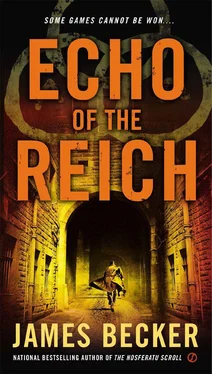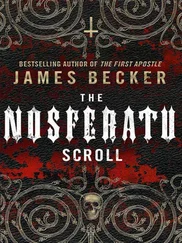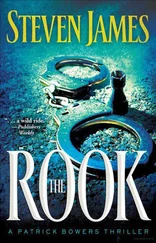James Becker - Echo of the Reich
Здесь есть возможность читать онлайн «James Becker - Echo of the Reich» весь текст электронной книги совершенно бесплатно (целиком полную версию без сокращений). В некоторых случаях можно слушать аудио, скачать через торрент в формате fb2 и присутствует краткое содержание. Жанр: Триллер, на английском языке. Описание произведения, (предисловие) а так же отзывы посетителей доступны на портале библиотеки ЛибКат.
- Название:Echo of the Reich
- Автор:
- Жанр:
- Год:неизвестен
- ISBN:нет данных
- Рейтинг книги:3 / 5. Голосов: 1
-
Избранное:Добавить в избранное
- Отзывы:
-
Ваша оценка:
- 60
- 1
- 2
- 3
- 4
- 5
Echo of the Reich: краткое содержание, описание и аннотация
Предлагаем к чтению аннотацию, описание, краткое содержание или предисловие (зависит от того, что написал сам автор книги «Echo of the Reich»). Если вы не нашли необходимую информацию о книге — напишите в комментариях, мы постараемся отыскать её.
Echo of the Reich — читать онлайн бесплатно полную книгу (весь текст) целиком
Ниже представлен текст книги, разбитый по страницам. Система сохранения места последней прочитанной страницы, позволяет с удобством читать онлайн бесплатно книгу «Echo of the Reich», без необходимости каждый раз заново искать на чём Вы остановились. Поставьте закладку, и сможете в любой момент перейти на страницу, на которой закончили чтение.
Интервал:
Закладка:
The bound man grunted once as the copper-jacketed bullet slammed into the center of his chest, then slumped forward, killed instantly by the single shot. The front of his T-shirt turned red as blood flooded out of the entry wound. Below the chair, more blood began to pool on the floor from the ruptured vessels and ripped flesh of the exit wound that Bronson knew the bullet would have torn in his back. Behind the chair, the rubberized sheets of the movable bullet trap swung gently backward and forward, having done their job in stopping the nine-millimeter slug after it had performed its deadly task.
Bronson’s mind suddenly filled with images of Baghdad. He’d done two tours of duty in Iraq as an army officer, and had been involved in several firefights during that time. But that was a very different environment: contesting ownership of the streets of the battered city with heavily armed insurgents, clearing rebel-held houses using grenades and automatic weapons, the enemy dimly seen shapes flitting from one piece of cover to another as they fired long bursts from their Kalashnikov assault rifles. For a while, the whole city had become a single killing zone, and Bronson genuinely had no idea how many Iraqis had fallen to bullets fired from his SA-80 or his pistol. Anonymous men fighting for their country or for their leader, and dying in droves as a result. Urban warfare was perhaps the bloodiest and most unpleasant form of conflict.
But even that hadn’t left the same kind of sick feeling in his stomach that Bronson was now experiencing. He’d just carried out an execution-the cold-blooded killing of a man he’d never seen before-and he’d done it as much as anything to save his own skin. Because he was absolutely certain that if he’d refused to pull the trigger, Marcus would have carried out his threat without a second thought. The man lashed to the chair would still be dead, and Bronson would have been lying beside him.
The only sliver of comfort Bronson could take from what had just happened was that at least the man had been killed instantly by the single bullet and hadn’t suffered. And he, Bronson, was still alive, and that meant that he still had the ability to bring Marcus and his gang of thugs to justice.
“Good shot, Mr. Bronson,” Marcus said, stepping forward and holding out the plastic bag for Bronson to drop the Walther into.
Bronson handed over the weapon-again, there was nothing else he could do because of the watchful armed men in the room, and the pistol was useless to him now that it was unloaded-as he stared across at the dead man in the chair. Even as he watched, a couple of Marcus’s men stepped forward and began to release the leather straps that still held the corpse in place. Released from his bonds, the dead man tumbled untidily to the floor to lie facedown on the discolored concrete, the exit wound on his back now clearly visible.
Any vestige of hope that Bronson might have harbored that he was part of an elaborate theater, that the man’s injuries had been faked and that the cartridge was a blank, was dashed in that instant. He’d seen dead men before, and the unmistakable limpness of the body as it thudded on to the concrete floor told its own story. He was in no doubt whatsoever that he’d just committed murder.
“Who was he?”
“What?”
Bronson pointed at the figure lying on the floor. “The man I just executed for you,” he said. “I’d like to know his name.”
Marcus nodded. “Yes,” he replied, “I suppose we owe you that, at least. His name was Herman Polti, and perhaps I ought to clarify one small point. I told you that he was in contact with the Berlin police, and that was not entirely true. In fact, I should say it was wholly untrue. Polti was actually an undercover police officer, much as Georg feared you might be when you first made contact with his group.”
As Marcus’s words sank in, another wave of revulsion swept through Bronson. Police officers everywhere were accustomed to putting their lives on the line and, rightly or wrongly, killing a policeman was always considered to be one of the worst possible crimes. And arguably the worst possible way for any police officer to die was at the hand of a fellow policeman. What just happened had put Bronson beyond the pale. Way, way beyond it.
The German smiled coldly at Bronson. “So now we have you on film shooting a bound and helpless police officer, and we have a pistol with your fingerprints all over it. When we dump Polti’s body, we’ll ensure that the bullet and the cartridge case are found with it. The Walther and the film from the camera will be stored away in a safe place, but the moment you do something we don’t like, or we suspect that you might even be thinking of running off to the authorities, I’ll make sure that all the evidence is handed to the police. As of this moment, Mr. Bronson, we own you.”
And that, Bronson thought, was a pretty reasonable summary of the situation. But as he looked into the German’s cold eyes, Bronson made himself a promise. No matter what happened, someday, somehow, he would come back, find Marcus and kill him.
For a few seconds, Bronson stared at the scene in front of him. One of the men had brought in a rigid stretcher, the top covered with a plastic sheet, and he and another man were in the process of placing the body of the dead man on it. A third man was standing near the chair, a bucket of some kind of granular material, possibly sawdust, in his hand, and he was sprinkling it over the bloodstains.
Bronson looked back at Marcus. “So what happens now?” he asked.
The German looked slightly surprised at the question. “You’re one of us now,” he replied, “but there’s nothing for you to do in Germany. I have a full team here and in any case you don’t speak the language, or so I’ve been told. I’ll tell Georg that you passed our little test, and that he can trust you to do the right thing. And we both know exactly why he can trust you. Then it’s up to him to decide how best to make use of your talents in London before the Laternentrager gets there.”
Bronson’s face reflected the confusion he was feeling. “The what?” he asked. “What are you talking about?”
Marcus shook his head, and for the first time looked a little uncomfortable. “It’s just a German expression,” he replied. “Forget I said it. Now,” he continued briskly, “I’ll get one of my men to drive you back to your car. By the time you reach London I’m sure Georg will have organized some jobs for you to do.”
The German reached into his jacket pocket and took out an envelope, which he handed to Bronson. Inside were six five-hundred-euro notes.
“What’s this?” Bronson asked. “Blood money?”
“No. You’re now on our payroll, and so you can call that an advance of salary.”
Three minutes later, having retraced his steps, Bronson was back in the garage, accompanied by two of the Germans, neither of whom seemed inclined to speak to him, not that he was interested in holding a conversation. Marcus had told him that he’d be driven back to his car by one man, which had immediately suggested to Bronson the possibility of taking the initiative and overpowering him, and then somehow getting back inside the building to find the pistol and the incriminating film footage. But against two armed men, Bronson knew he wouldn’t have a chance.
In the garage, one of the men stood opposite the double metal doors and used the remote control to open them, while the other walked over to one of the BMWs, opened the driver’s door, gestured to Bronson to get in the back, and then sat down. As soon as the doors were open, to reveal the midevening gloom, he drove the car out of the garage, pausing to allow his companion to walk over to the car and sit down in the front passenger seat.
Читать дальшеИнтервал:
Закладка:
Похожие книги на «Echo of the Reich»
Представляем Вашему вниманию похожие книги на «Echo of the Reich» списком для выбора. Мы отобрали схожую по названию и смыслу литературу в надежде предоставить читателям больше вариантов отыскать новые, интересные, ещё непрочитанные произведения.
Обсуждение, отзывы о книге «Echo of the Reich» и просто собственные мнения читателей. Оставьте ваши комментарии, напишите, что Вы думаете о произведении, его смысле или главных героях. Укажите что конкретно понравилось, а что нет, и почему Вы так считаете.












